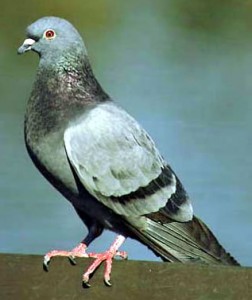I would place Pierre Flourens primarily in the category of creation. I think Flourens most significant contributions are related to creation. As we’ve moved further into the text, it seems that many people are trying to understand and comprehend our minds and our brains. Are they one and of the same? Or are they completely separate entities? What is this whole brain-mind relationship and how does it effect my actions and my body?
Flourens was genius in deciding to use the method of ablation or extirpation to discover more about the brain. Rather than assuming different parts of the brain and their functions, Flourens decides to try the reverse. He tries to see what exactly different parts of the brain do. He tested this by using dogs and pigeons (like the one pictured above), which he thought were similar to humans. His researcher is fascinating because it shed some light on the situation. For example, Flourens says that the removal of the cerebellum disturbed the coordination and equilibrium of that organism. He goes on to list other observations, too. Some animals that lost part of their functioning due to ablation sometimes regained their functioning.
Something I think is different about Pierre Flourens is that it never really seems like he’s trying to make this big drawn out point to defeat and put down someone else’s idea. He just appears to be looking for further understanding on the human brain and mind. I don’t think he was necessarily looking for research so that he could fix every problem all of us stupid humans. Instead, I think Flourens wanted to understand the basic creation of his and others bodies. I can also see how you could put Flourens in the fall category because chances are he’s seen faults… in someone’s coordination, personality, balance,etc. He also sees that we fail to some aspect whenever certain parts of our brain are missing. Something missing from our brains can effect our character traits, moods, personalities, etc. and those things speak to the truth that there is a fall.


Jessica Weeden
2:45 pm, 10.20.13
Jacey, I enjoyed reading your thoughts on Flourens. His passion for knowledge is impressive and did lead to greater understanding of our minds and bodies. You did a good job pointing out how he could fit into the Fall due to his understanding of the faults in humans, but I agree that he could better fit into Creation. It appears that he just simply wanted to reach greater understanding of how the brain works and effects the individual. You are correct that this doesn’t seem to be any attempt to fix (restoration) people, explain faults (fall), or make something new (new creation).
Savannah Wesley
10:12 am, 10.21.13
Although the Fall is prevalent in Flouren’s work, I enjoyed the fact that you placed him in Creation. When I first read Flouren, due to the blogs, I immediately placed him in the Fall, so I am very glad that you changed my mind on Flouren’s work!
Nicole Nelson
4:04 pm, 10.21.13
Jacey,
I liked your post a lot! You really put Flouren’s in a positive light, and for good reason I believe. It was very intriguing to me, the fact that you put him in with creation. Since he is best known for ablation, I think my automatic assumption was that he should be placed in the Fall category. Because how can someone who destroys what God has created, for the good of science, be put in the category of creation. But I really like how to you went on to explain it and ended up convincing me. I think you bring it all together when you say he just wanted to understand the creation of all these beings. And I really like how you even give some support to him inline with the Fall at the end. Great post!
Levi Ritchie
10:22 pm, 10.21.13
I spent a lot of time today thinking about this post and how the idea of exploring the human brain is, in its own way, exploring God’s creation. It’s something, kind of like sex, that we try to avoid when we talk about creation. It’s a messy subject, and it’s hard to be reminded that not all of our character is safely locked away with a soul that can’t be damaged, but rather much of it can be seen in our fragile brains. In exploring theology and understanding the people God made (or is making us) to be, though, it’s so critical that we look to new ways to see humanity. Thanks for the read.